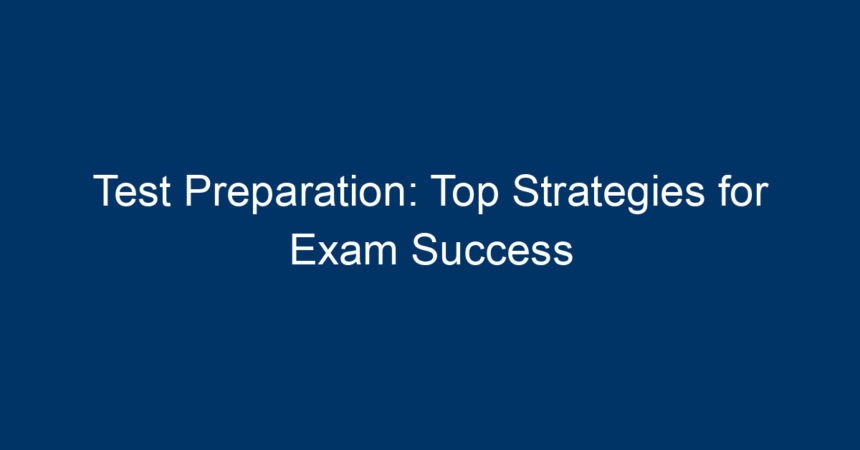Preparing for exams can often feel overwhelming. With deadlines looming and volumes of material to cover, students frequently find themselves in a state of panic. However, effective test preparation can make a significant difference in easing this stress and boosting performance. This article covers essential strategies to enhance your test preparation, leading you to academic success.
Understanding the Importance of Test Preparation
Effective test preparation not only helps you grasp the material but also equips you with the confidence to approach your exams with poise. A well-structured preparation strategy can reduce anxiety and improve recall, ultimately leading to better scores.
Why You Should Care About Test Preparation
- Maximizes Performance: Good preparation allows you to demonstrate your understanding of the subject matter fully.
- Enhances Retention: The strategies that work in effective test preparation can increase information retention, making it easier to recall during exams.
- Builds Confidence: Knowing that you have prepared adequately for a test can significantly boost your self-esteem.
Planning Your Test Preparation
Set Clear Goals
The first step in effective test preparation is to establish specific objectives. Ask yourself:
- What topics need the most attention?
- Am I more comfortable with some subjects than others?
- What are my specific score goals for each exam?
Once you find clear answers, it becomes easier to prioritize your study time.
Create a Study Schedule
A well-organized study schedule is crucial for effective test preparation. Break your material down into manageable sections and allocate specific days and times for each topic.
Tips for Creating Your Study Schedule:
- Be Realistic: Aim for consistency rather than cramming.
- Incorporate Breaks: Your brain needs rest. Use techniques like the Pomodoro Technique, which involves working for 25 minutes and then taking a 5-minute break.
- Use a Planner: Digital tools like Google Calendar, or even a physical planner, can be handy for visualizing your study sessions.
Active Study Techniques
Use Thematic Study
Guide your preparation by grouping related topics. This technique allows you to see connections between subjects and can improve critical thinking skills. For instance, if you are studying for a history exam, focus on particular eras together, rather than bouncing wildly between different time periods.
Practice with Past Papers
One of the most effective methods in test preparation is practicing with previous years’ exam papers. This helps you:
- Understand the exam format
- Identify commonly asked questions
- Manage your time during the actual test
Engage in Group Study
Studying with peers adds a layer of accountability. Group study sessions can provide different perspectives on complex topics and offer opportunities for discussion, which can deepen your understanding.
Best Practices for Group Study:
- Assign roles or topics to each member for comprehensive coverage.
- Use flashcards for quick quizzes to engage everyone.
- Maintain a focused and distraction-free environment.
Effective Note-Taking
Discover Your Style
The way you take notes can significantly impact your test preparation. Techniques vary, so find what works best for you:
- Cornell Method: Divides your notes into cues, notes, and a summary.
- Mapping: Visual representations can help enhance understanding, especially for visual learners.
- Traditional Outlining: Hierarchical structure can help break down complex information.
Utilize Technology
Using apps like Evernote or Notion can help organize your notes more effectively. Digital tools enable easy searching and accessibility.
Revision Techniques
Spaced Repetition
Implementing spaced repetition techniques into your test preparation can significantly boost retention. This involves reviewing material at spaced intervals over time, which helps encode information for the long term.
Teach What You Learn
Explaining topics to others not only reinforces your understanding but also highlights areas where you may need further review.
Mind Mapping
Mind maps are powerful tools for visual learners. By creating a visual representation of complex topics, you can map out connections and hierarchies in the subject matter, which is useful for conceptual exams.
Wellness in Test Preparation
Maintain a Balanced Diet
A nutritious diet plays a vital role in cognitive performance. Foods rich in omega-3 fatty acids, antioxidants, and whole grains can enhance focus and memory. Incorporate plenty of fruits, vegetables, and lean proteins into your meals.
Regular Exercise
Physical activity can alleviate stress and boost brain function. Even light exercise, such as a 30-minute walk, can improve your mood and concentration.
Adequate Sleep
Never underestimate the power of sleep in your test preparation. Ensure you get 7 to 9 hours of quality sleep, especially before an exam. Studies show that sleep is essential for memory consolidation.
Day of the Exam: Last-Minute Strategies
Stay Calm and Focused
On the day of the exam, it’s essential to keep your emotions in check. Practice mindfulness techniques like deep breathing to manage anxiety.
Review Key Concepts
Instead of trying to cram in new information, spend the night before the exam reviewing key concepts and summaries.
Pack Early
Prepare your materials the night before, including calculators, pens, pencils, and snacks. This preparation can reduce the rush and stress on exam day.
Concluding Insights
Effective test preparation is a combination of planning, active study techniques, wellness, and smart revision strategies. By incorporating these strategies into your study routine, you’re likely to see better results and experience less stress during the exam period.
Actionable Tips:
- Set your study goals today.
- Create a detailed study schedule.
- Incorporate active study techniques like past papers and group sessions.
- Focus on wellness with a balanced diet and adequate sleep.
- Practice mindfulness for stress management on exam day.
By prioritizing your test preparation strategy now, you are setting the foundation for a successful academic career in the future. Happy studying!




